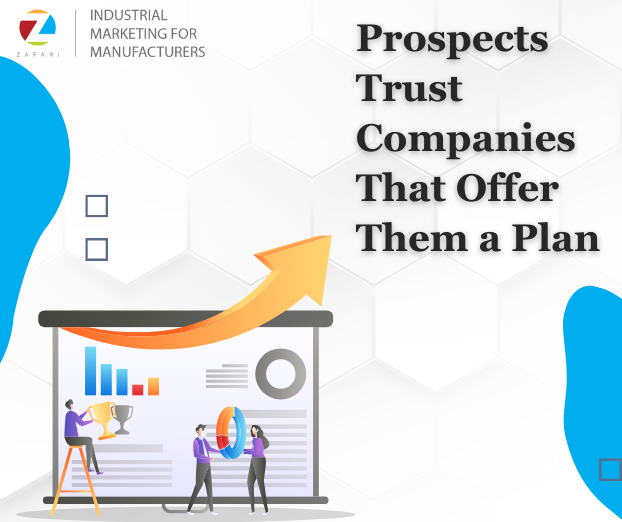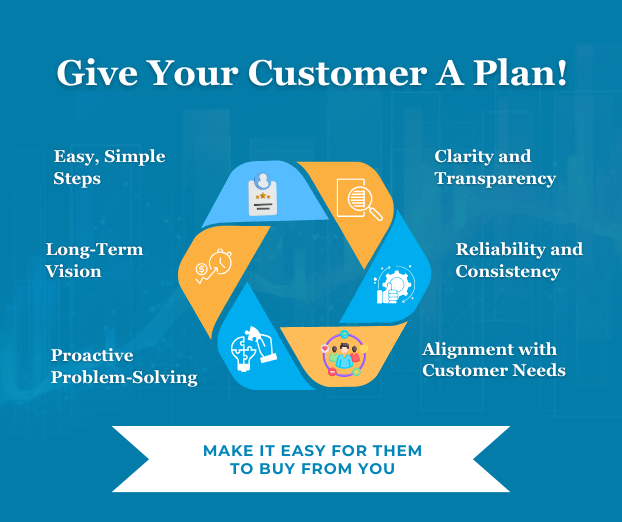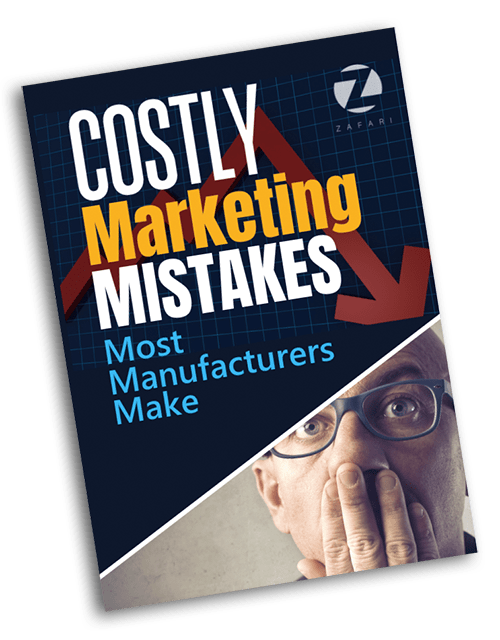There may be many potential customers who acknowledge your expertise.
Is that enough to make them buy from you?
They still look for assurance they can trust you before making a purchase.

Why?
Because at this point, they’re vulnerable to risks such as financial loss, wasted time, or diminished reputation.
For example, imagine a mobile device company dealing with a chipset maker. While the chipset manufacturer has established its credibility, the mobile company may hesitate to commit.
The mobile company fears investing its limited resources into a solution that may not yield the desired results. Additionally, they worry about the potential disruption to their operations and the impact it might have on their reputation within the industry.
Thus, even though they are aware of the chipset’s expertise, they seek further assurance and a clear plan to deal with potential pitfalls before making a purchasing decision.
A simple plan can be used in this scenario to show how straightforward it is to work with you. By breaking down the process into manageable steps, you minimize their concerns and encourage them to take the initial leap. This strategy not only reassures prospects, but also encourages them to enter the purchasing phase.
So, what kind of plan can you offer to ease your prospects’ journey towards making a buying decision? Ideally, you’ll first give them an easy 3 or 4 step plan showing them how easy it is to work with your company. The goal of this is to help them overcome their natural hesitance and inertia so they feel more comfortable taking action. This might look like:
Step 1 – Tell Us Your Vision and Goals
Step 2 – Receive a Tailored Solution Just For You
Step 3 – Get Fast, Easy Delivery and 24/7 Support
This is the type of very high-level plan would be displayed prominently on your website and in other marketing collateral such as brochures. Further down the buyer’s journey, you would elaborate into more details to make the full process as clear and accessible as possible. The goal is to eliminate confusion, answer questions before they even have them and further build trust. This more detailed plan should reinforce the following characteristics:

Clarity and Transparency
A well-crafted plan helps customers understand what to expect from their service provider. It highlights the company’s objective, timelines, processes, and deliverables transparently.
With this transparency in place, customers can track progress, anticipate timelines, and align their operations accordingly.
Moreover, clear communication about cost, quality, and potential risk will foster trust and confidence in the vendor’s ability to deliver as promised.
Reliability and Consistency
Delivering on time is important to keep your customers satisfied and retained, especially in the field of B2B manufacturing.
Customers rely on companies to deliver products or services on time. A detailed plan demonstrates the company’s ability to meet these expectations consistently.
Moreover, consistent on-time delivery leads to long-term customer retention. When customers rely on a manufacturer to meet their orders promptly, they are more likely to return for future business.
Alignment with Customer Needs
Every customer is unique, with distinct goals, challenges, and priorities. Equipped with such insights, companies can create plans that address particular pain points and objectives of their target audience.
This might involve creating tailored products, services, and solutions to meet their unique requirements.
Rather than imposing ready-made solutions, companies work hand in hand with clients to co-create plans that align with their goals and aspirations. This collaborative approach not only strengthens the relationship but also leads to better outcomes and mutual success.
Proactive Problem-Solving
A comprehensive plan outlines goals and strategies. But it should also list potential obstacles and challenges that customers might face.
By proactively mentioning these risks and detailing solutions, companies can show their readiness to tackle any unforeseen circumstances. Talking about its impact on your customers, they will feel confident in your approach.
For example, a B2B manufacturer has outlined the problems or issues their customers face during the installation and operation of their machinery. These challenges could be supply chain disruptions, technical malfunctions, or regulatory compliance issues.
However, the manufacturer gives them peace of mind by assuring them of technical support, maintaining spare parts inventory, or providing them on-site training for operators. This way, they show their readiness to deal with any circumstances.
This approach reassures customers that the manufacturer is committed to their success and well-prepared to address any challenges that may arise, fostering confidence in their partnership.
Long-Term Vision
Your customers may also want to be aware of your short-term goals and long-term vision as well. This is because when they see that the company has a clear vision and roadmap for growth, it instills confidence in the stability and longevity of the relationship.
Let’s say there is a B2B manufacturer specializing in renewable energy solutions, such as wind turbines and solar panels.
In its comprehensive plan, the company not only outlines its short-term goals, such as increasing production capacity and expanding market reach but also strategic objectives for the future.
These strategic objectives may include investing in research and development to improve the efficiency of their products. Maybe they are looking to venture into new geographical markets. They also show that they are opting for emerging technologies like energy storage solutions.
With this long-term vision and commitment to sustainability, the company assures that it will make their product more efficient and eco-friendly. As a result, the customers will assume that the manufacturer is not only focused on short-term goals but also looking to build a sustainable future.
Accountability and Feedback
Another benefit of having a plan is to establish accountability within the company. It clearly defines roles, responsibilities, and performance metrics. It holds employees accountable for delivering on their commitments.
This means people can’t just say they’ll do something and forget about it – they have to follow through. Plus, incorporating a feedback system into the planning process enables companies to listen to customer input, adapt their strategies, and continuously improve.
This culture of accountability and responsiveness strengthens trust by demonstrating a commitment to customer satisfaction.
The Bottom Line
Offering customers a plan is more than just a strategic move.
It’s a testament to a company’s commitment to transparency, reliability, customer-centricity, and long-term success.
By creating a clear roadmap, addressing customer needs, proactively addressing challenges, and fostering accountability and adaptability, companies build trust.
And this very trust with their customers forms the foundation of enduring relationships. Offer customers a plan to stand out as reliable partners who prioritize transparency, consistency, and customer satisfaction.





